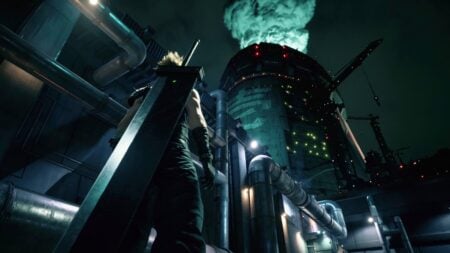Skip To...
Have you ever wondered how a modern American Civil War would look? That’s exactly what you’ll see in Civil War, the new dystopian war film that tells the story of the last moments of an imagined near-future American Civil War. It was written and directed by Alex Garland (Ex Machina), and it stars Kirsten Dunst (Spider-Man), Wagner Moura (Narcos), Cailee Spaeny (Priscilla), Stephen McKinley Henderson (Dune), Nelson Lee (Ahsoka), Jesse Plemons (Game Night) and Nick Offerman (Parks and Recreation).
Full of tension, it follows a group of journalists on their way to Washington D.C. from New York, so they can interview the President of the United States (Offerman). Civil War’s story is fairly straightforward. Of course, there are a few roadblocks along the way but that’s essentially what the plot boils down to. You aren’t clued in much to the context or minutiae of the Civil War itself, it’s unfortunately just relegated to the film’s setting. While the war is used in multiple ways, a little context might’ve helped the story in a few areas.
Is Civil War Apolitical?
Civil War follows four characters who are all journalists, the weathered photojournalist Lee (Dunst), the rookie Jessie (Spaeny), the adrenaline seeker Joel (Moura), and the veteran Sammy (Henderson). Journeying from New York they encounter checkpoints, shootouts, military operations, rogue snipers, and just about everything one would expect in a warzone. America is in shambles, not that we’re too sure how the fighting started. We do know that the country is split into four different factions, with the Western Forces taking the fight straight to the President.
We could spend the next few minutes breaking the Civil War down, but that isn’t represented in the film itself so why bother? The catalyst for the war isn’t provided besides the President giving a speech in the beginning, and we know that he’s in his third term. So, he’s likely turned the presidency into a dictatorship. But that isn’t what the film is about. Instead, it’s a character-led story. A story about whether Lee can compartmentalize her feelings, and whether Jessie can overcome her own and become more like Lee. It’s a story about the media and its role in the stories they tell.
These characters make the film worth watching. Nobody phones in their performances. Dunst is great, making Lee feel like this is the 15th war she’s watched unfurl. Spaeny is perfectly displaying Jessie’s naïveté and nails the emotional beats. Moura surprised me as Joel, showing off realistic hysteria, coming off as charismatic, and nailing some of the more bone-chilling, nerve-racking moments. Plemons also deserves a shoutout. He doesn’t have much screen time but is incredibly unsettling in the scene that he’s in.
It Wouldn’t Be a Civil War Without Some Explosions
Civil War emulates and references other wars throughout history, including many that the U.S. was directly involved in. There are many visual parallels between the war in the movie and conflicts in the Middle East and even Vietnam. Referencing these conflicts grounds the film, only to be swatted back down by the fact that you don’t know what’s going on – which is the civilian response to most conflicts. Ultimately, while context would have been appreciated, the film does just fine without it because it’s more of a character study than anything else.
It does comment on how we turn a general blind eye towards war when it isn’t on our shores (or in our towns), but nearly every metaphor in the movie could’ve been pushed further. With that being said, the story does end up being somewhat predictable given that it is a straightforward war film. But, the events of Civil War are memorable. So much of the imagery helps it stay that way, with shots of wartorn (and thriving) America, dead bodies, and mundane scenes of beauty in nearly every scene. It’s a beautiful-looking movie that plays with the edge of the frame extremely well.
Oddly enough, even though most of the film doesn’t have large-scale action scenes, the final act plays like a good Call of Duty campaign mission, and while Civil War intentionally tees that up, it’s quite unexpected. There are violent scenes in the movie, but we don’t see much being perpetrated – much of the actual war – until the end, which tremendously increases its impact. Both the predictably and the action of the final act, make the film a tragedy. What’s worse is that it’s an avoidable tragedy, which might make up the most salient message of the movie.
You’re Sounding a Bit Tense
The sound design in Civil War is phenomenal. The sound of the gunshots is harrowing, especially when they’re immediately cut by the silence of one of the photographs. Whenever either character takes a photo, we see how the scene looks through the lens, with no sound to accompany it. This is one of the many ways in which Civil War stops itself from becoming an all-out action movie. Combined with the score (Geoff Barrow, Ben Salisbury), the sound also fills the movie with tension. They work together to amp up the intensity whenever the characters are put in situations where they’re in danger.
You’ll be watching the characters move through scenes through your own gritted teeth. You’ll care about them, and you’ll wish that they don’t make the mistakes that you know they will. It’s the sign of a good horror movie when you’re yelling at the screen to tell your favorite character not to go into that bedroom. At times, that’s exactly what Civil War feels like. It’s not perfect, and at times it feels empty, but the performances and characters are so good that you won’t be able to help but feel something, even if it’s an intense and overwhelming sense of dread.
If you like war movies or movies about journalism, you’ll want to go see this in the largest, loudest theater you can. There’s still a chance you’ll have a good time even if you don’t like those types of films, just don’t get hung up on the more political side of the movie. You can catch Civil War in theaters from April 12, 2024.
Civil War
Civil War is a tense war film that has great characters and performances, accompanied by a simple story that can feel predictable and empty.
Pros
- Great performances that fit relatable and realistic characters.
- Terrific score and sound design that fills the film with overwhelming tension.
- Good violent set pieces, filled with memorable imagery.
Cons
- Too vague with the minutiae of the war’s politics.
- The story is a tad predictable.









